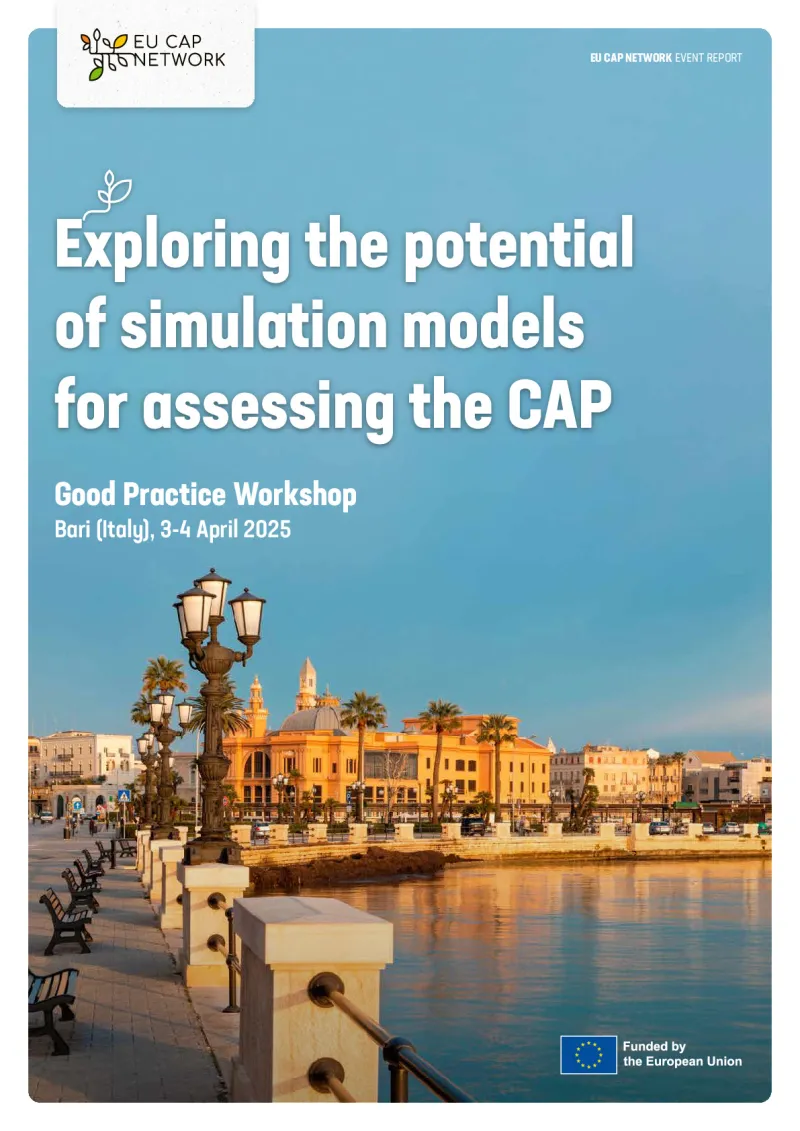Explorer le potentiel des modèles de simulation pour évaluer la PAC
- Évaluation
- Méthodes d'évaluation
- Méthodes d'évaluation
- Impacts transversaux
- Environnement
- Climat et changement climatique
- Évaluation
- Processus d'évaluation
Ce rapport résume les conclusions du Good Practice Workshop qui s'est tenu à Bari les 3 et 4 avril 2025 et qui a réuni 69 participants issus de 21 États membres.
- Italie
- Programming period: 2023-2027
- Impacts transversaux

Le rapport portant sur l'événement résume les débats qui ont eu lieu entre les participants lors du neuvième Good Practice Workshop, organisé par le Réseau européen de la PAC avec le soutien du Helpdesk européen d'évaluation de la PAC, à Bari, en Italie, les 3 et 4 avril 2025, qui était axé sur l'exploration de l'application des modèles de simulation pour les évaluations de la PAC.
L'événement a réuni 69 participants issus de 21 États membres, notamment des autorités de gestion, des réseaux de la PAC, des évaluateurs, des spécialistes de la modélisation et d'autres parties prenantes impliquées dans l'évaluation des politiques agricoles.
Le workshop a fourni une plateforme pour l'échange de connaissances sur le rôle des modèles de simulation dans l'élaboration de politiques fondées sur des données probantes, l'évaluation de l'impact et la correction des lacunes en matière de données, en particulier en ce qui concerne les interventions du premier pilier et les évaluations environnementales.
Grâce à des études de cas provenant d'Autriche, du projet Horizon Europe Tools4CAP, des Pays-Bas et de Hongrie, ainsi qu'à des discussions structurées, les participants ont pu découvrir les possibilités et les limites liées à l'utilisation de modèles de simulation, tels que le modèle positif pour le secteur agricole autrichien (PASMA) et le modèle d'impact régionalisé de la politique agricole commune (CAPRI).
Les interactions ont souligné la capacité des modèles de simulation à quantifier les effets des politiques et à prévoir leurs résultats dans différents scénarios, tout en mettant en évidence les défis liés à la qualité et à l'accessibilité des données, à la complexité des modèles, à l'expertise technique et à la nécessité d'une communication transparente des hypothèses et des résultats des modèles.
Une conclusion clé du workshop est que, si les modèles de simulation ne peuvent remplacer les méthodes d'évaluation empiriques dans toutes les circonstances, ils constituent un outil précieux pour combler les lacunes en matière d'information et améliorer l'orientation stratégique des évaluations de la PAC.
Une recommandation méthodologique clé qui est ressortie est la triangulation des rendements de la simulation avec des méthodes de validation économétriques et qualitatives afin de garantir la robustesse et la légitimité des parties prenantes.
Des possibilités futures ont été identifiées pour intégrer l'intelligence artificielle dans les processus de modélisation et pour améliorer la disponibilité des données grâce à la transition du réseau d'information comptable agricole (RICA) vers le Réseau d'information sur la durabilité des exploitations agricoles (RIDEA).
Le workshop a en outre identifié une série de priorités stratégiques pour faciliter l'adoption de modèles de simulation, notamment le développement des capacités techniques au sein des autorités de gestion, l'investissement dans des systèmes de données fiables et interopérables, la promotion de partenariats institutionnels avec des structures universitaires et de recherche, et la promotion d'une « culture de la modélisation » dans le domaine de l'évaluation des politiques.
Author(s)
EU CAP Network